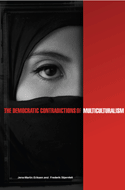Milan Vukomanovic reviews Jens-Martin Eriksen and Frederik Stjernfelt’s The Democratic Contradictions of Multiculturalism, now available in English translation from Telos Press.
 In its “soft” meaning multiculturalism is, according to these authors, quite compatible with the idea of democracy and liberal-democratic political culture. It concerns the freedom of an individual to choose culture, religion, worldview and identity that suits him/her, as long as that person does not represent an obstacle to freedom of others who also wish to affirm, or determine, themselves within their own individual rights, values, proclivities and norms. However, problems arise in the context of a “hard” interpretation of multiculturalism seen as a system that advocates inviolability, and even sovereignty, of collective cultural rights. In other words, as Eriksen and Stjernfelt argue, this is a version of multiculturalism based on the holiness and immunity of different cultures as their collective rights. . . .
In its “soft” meaning multiculturalism is, according to these authors, quite compatible with the idea of democracy and liberal-democratic political culture. It concerns the freedom of an individual to choose culture, religion, worldview and identity that suits him/her, as long as that person does not represent an obstacle to freedom of others who also wish to affirm, or determine, themselves within their own individual rights, values, proclivities and norms. However, problems arise in the context of a “hard” interpretation of multiculturalism seen as a system that advocates inviolability, and even sovereignty, of collective cultural rights. In other words, as Eriksen and Stjernfelt argue, this is a version of multiculturalism based on the holiness and immunity of different cultures as their collective rights. . . .
Culturalism, a key concept that Eriksen and Stjernfelt assess from different angles in their Politics of Segregation, is employed, as an ideological construct, both on the political left and the political right. On the left, multiculturalism is uncritically accepted as any initiative that has legitimacy of a religion or culture. On the right, culturalism is most often vested in nationalism, with a necessary (and sufficient) legitimacy provided by a local culture, history, tradition. Danish authors note that the link between these two forms of cultutralism is often overseen, mostly due to the fact that they are advocated by the political opponents. But the consequences of the blank support that both of them give to this idea are far-reaching: this is where the modern adherents of ethno-nationalism and religious fundamentalism feed themselves, albeit in two different ways.
Vukomanovic’s full review, entitled “Hostages of Culturalism,” can be read here.



